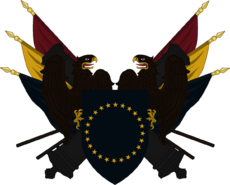Constitution of Carloso: Difference between revisions
| Line 28: | Line 28: | ||
==History== | ==History== | ||
==Influences== | ==Influences== | ||
[[File:Carlo Crivelli 007.jpg| | [[File:Carlo Crivelli 007.jpg|200px|thumb|The thirteenth century Catholic philosopher and theologian {{wpl|Thomas Aquinas|Saint Thomas Aquinas}} is considered to be a major influence on the Constitution of Carloso, in particular his ''{{wpl|Treatise on Law}}'' within the ''{{wpl|Summa Theologica|Summa Theologiae}}''.]] | ||
[[File:Marek Tuliiusz Cyceron.jpg|150px|thumb|left|The Roman politician and philosopher {{wpl|Cicero}}, also considered to be a major influence. President Sartega often referred to Cicero's ideal constitution within ''{{wpl|De Legibus}}''.]] | |||
==Main provisions== | ==Main provisions== | ||
Revision as of 02:33, 10 March 2019
This article is incomplete because it is pending further input from participants, or it is a work-in-progress by one author. Please comment on this article's talk page to share your input, comments and questions. Note: To contribute to this article, you may need to seek help from the author(s) of this page. |
| Constitution of the Federal Republic of Carloso Constitución de la República Federal de Cárloso | |
|---|---|
 | |
| Date effective | 20 June 1956 |
| Author(s) | Emmanuel Sartega |
| Purpose | To replace the Constitution of the Republic of Carloso |
The Constitution of the Federal Republic of Carloso (Spanish: Constitución de la República Federal de Cárloso), commonly referred to simply as the Constitution of Carloso or the 1956 constitution is the fundamental law of Carloso. While it is widely regarded to fall within the tradition of liberal Western democracy, recent amendments have been referred to as illiberal by some commentators.
The Constitution created a system of representative democracy in Carloso, inherited from the previous constitution, but established Carloso for the first time as a federation of administrative provinces rather then a unitary state. While generally categorised as a federal republic, Carloso under the 1956 constitution is often referred to as a 'quasi-federal' or a 'unitary state with a federal spirit', due to the limited powers delegated to the provinces and the supremacy of the central government.
Background
History
Influences


Main provisions
Original text
Amendments
Judicial review
Controversies
English versus Spanish texts
Issue of state religion
While the preamble of the Constitution heavily refers to both the Holy Trinity and the Lord Jesus Christ, the Federal Republic of Carloso was established as a de jure secular state. In reality, President Sartega; who was well known for his admiration of Saint Augustine of Hippo and in particular Saint Thomas Aquinas, took heavy influence from Roman Catholic teachings. Under the guidance of the Archbishop of Madrigal, David McMillan, the Constitution recognised "the special position of the Christian churches in Carlosian society as being necessary for public morality and order", stopping short of recognising the Catholic Church exclusively in order to placate Anglicans and Presbyterians.